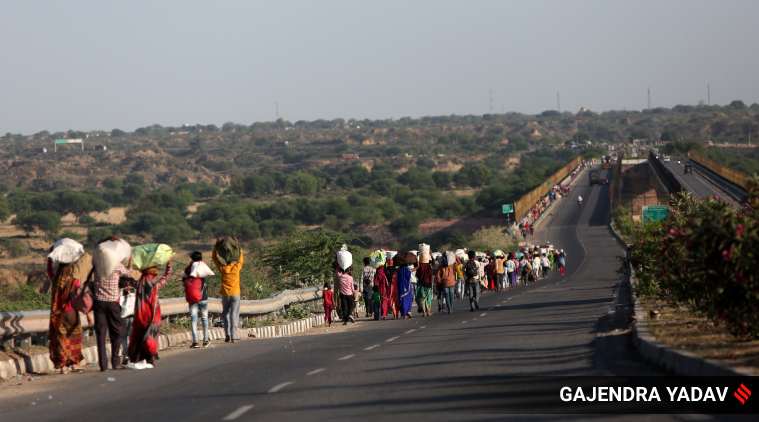India’s anti-COVID strategy is premised on a mistaken idea and a pretence
Epidemics are social dramas whose plots are made from the bricks and mortar of local material. An understanding of this will tell us who lives, who dies and what kind of society emerges.
Written by Sanjay Srivastava
|
Updated: April 1, 2020 9:37:05 am

X
The most significant aspect of life in countries such as India is informality — of jobs, living arrangements, healthcare, mobility and much else. We know, for example, that around 90 per cent of the population works in the non-formal sector, around 20 per cent of Indians are internal migrants (the vast majority moving across district and state boundaries for informal employment) and that, in many of our major cities, as much as 40 per cent of the population lives in informal settlements. Informality is the state of life beyond regulation. It is also a condition of great helplessness, where the capacity to exercise choice over one’s destiny is limited. For the majority of India’s (and the world’s) population, informality is not a staging post on the way to formality. It is a persistent condition of life with no indications of a dramatic change.
Yet, in India, we seem to have decided to not address the context that is most relevant to the conditions of life that have the greatest relevance to the majority of the population. This is the population that has no choice but to stay outdoors, live 10 to a room and be mobile as a livelihood strategy. There can be no universal strategy — or computer simulation — that can provide solutions for the present crisis. For, there is no “universal humanity”. While we share biology, we are fundamentally distanced by the histories that produce the social and economic conditions within which we live. This calls for specific strategies for dealing with COVID-19.
Editorial | Exodus of migrant labour from cities is an enormous human crisis, and an impending economic one
First, the issue of livelihoods. This has, so far, been primarily addressed through an anti-virus strategy that is premised on the idea that India is primarily a land of formal offices, industrial establishments and hotels. Indian cities contain some 10 million street vendors and street vending — just one form of informal work — makes up approximately 15 per cent of the urban workforce. If we were to add the circuits of interdependence — family members and those part of the product supply chain — then, according to sociologist Ritajyoti Bandyopadhyay’s estimates, street vending is second only to agriculture as a source of livelihood. Our cities are, then, spaces of intense and involuntary intermingling and a ban on such activity is a matter of further immiseration for millions. Should the government not have consulted bodies such as the National Hawkers Federation for policy measures that take account of the kind of cities we have rather than the imagined ones?
Second, while Indian cities are home to long-term rural migrants, these are not populations who have severed ties to their villages. They return home for a variety of reasons, the most significant being in moments of catastrophe such as slum demolitions, illnesses and job losses. And, of course, now the virus. The village is the hospice of the city. It provides treatment, rehabilitation and healing to the city’s underclass, returning them, without charge, to the city as an endless supply of labour. As might be imagined, circular migration is the highest among the poorest of urban populations and Muslims, Scheduled Castes and Tribes form the largest number of such migrants.
Opinion | At the stroke of midnight on March 24, India suspended ‘politics’. The effects will stay with us
Those who have no means of support in the city head home to the village in times of hardship. While some complain that circular migration holds back urbanisation, were it not for this extraordinary and constant to-and-fro movement between the city and the village, the former would be overwhelmed with the debris it makes out of the bodies of the urban poor. As the poor build the city (literally, since the construction industry is the largest employer of seasonal migrants), their key hope of relief from its misery is the ability to retreat to the village. Under current circumstances, they neither have the means of survival in the city nor are able to return to their villages. And those of them who have managed to scramble back will continue to live — for how long, who knows? — in the shadow of a virus they might carry. But they are out of sight of the broad-brush policy of lockdown.
Notwithstanding the persistence and overwhelming evidence of informality as a social and economic fact — across cities in particular — processes of policy-making and governance are based on the pretence that the model most suited towards administering people and places is one that borrows from an ideal-type. That is, while the actually existing conditions of urban life might call for methods of governance based on a localised understanding of actual conditions of life, what we invariably get is aspirational policymaking. Aspirational policymaking —we want our cities to become like Singapore and New York, so we think we can apply their policies at home — has little concern for the common good. It is based on the spurious idea of an India that must keep pace with the “global” world through acting “globally”. We build gated communities to keep problems out, rather than deal with them. Similarly, the consequences of aspirational policy-making are rarely considered. For, like much else, the task of dying and suffering is easily outsourced to those who can be locked out.